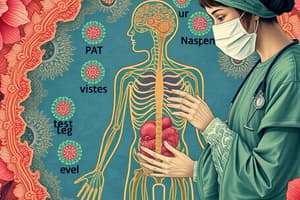Podcast
Questions and Answers
What is the significance of understanding human anatomy and physiology in nursing?
What is the significance of understanding human anatomy and physiology in nursing?
Which biological concept is essential for interpreting lab results in nursing?
Which biological concept is essential for interpreting lab results in nursing?
How does knowledge of microbiology contribute to nursing practice?
How does knowledge of microbiology contribute to nursing practice?
What role does biochemistry play in nursing?
What role does biochemistry play in nursing?
Signup and view all the answers
Why is knowledge of genetics important for nurses?
Why is knowledge of genetics important for nurses?
Signup and view all the answers
What is the impact of studying pathophysiology in nursing?
What is the impact of studying pathophysiology in nursing?
Signup and view all the answers
How does health promotion and education relate to biological knowledge in nursing?
How does health promotion and education relate to biological knowledge in nursing?
Signup and view all the answers
What is an emerging area of focus in nursing that relates to biology?
What is an emerging area of focus in nursing that relates to biology?
Signup and view all the answers
Study Notes
Importance of Biology in Nursing
- Foundation of Nursing Practice
- Understanding biological systems helps nurses assess patient health.
- Knowledge of anatomy, physiology, and biochemistry is crucial for diagnosing and treating conditions.
Key Biological Concepts for Nurses
-
Cell Biology
- Structure and function of cells.
- Importance of cellular processes: metabolism, respiration, and reproduction.
-
Genetics
- Basic principles of heredity and genetic disorders.
- Impact of genetics on patient health and treatment plans.
-
Human Anatomy and Physiology
- Major body systems: cardiovascular, respiratory, nervous, digestive, musculoskeletal, etc.
- Homeostasis: the body's ability to maintain stable internal conditions.
-
Microbiology
- Role of microorganisms in health and disease.
- Importance of infection control and prevention strategies.
-
Biochemistry
- Chemical processes within and related to living organisms.
- Nutrition and its biological impact on health.
Application of Biology in Nursing
-
Patient Assessment
- Use of biological knowledge to interpret lab results and physical assessments.
- Understanding symptoms in relation to biological processes.
-
Medication Administration
- Mechanisms of action of drugs based on biological principles.
- Importance of pharmacokinetics and pharmacodynamics.
-
Understanding Disease Processes
- Pathophysiology: how diseases affect normal biological functions.
- Impact of lifestyle and genetic factors on disease development.
-
Health Promotion and Education
- Educating patients about biological factors influencing health.
- Importance of preventive care and lifestyle modifications.
Emerging Areas
-
Genomics and Personalized Medicine
- Tailoring treatment plans based on individual genetic profiles.
- Impact of genetic testing on nursing care.
-
Bioethics
- Ethical considerations in biological research and nursing practices.
- Importance of informed consent and patient autonomy.
Conclusion
- A solid understanding of biology enhances nursing practice.
- It enables nurses to provide holistic and evidence-based care, improving patient outcomes.
Importance of Biology in Nursing
- Biological knowledge is essential for effective patient assessment and care.
- Understanding anatomy, physiology, and biochemistry aids in diagnosis and treatment of medical conditions.
Key Biological Concepts for Nurses
-
Cell Biology
- Cells are the fundamental units of life; their structures and functions are crucial.
- Key cellular processes include metabolism, respiration, and reproduction, impacting overall health.
-
Genetics
- Genetic principles help in understanding heredity and genetic disorders.
- Genetics informs patient health and tailors treatment plans based on hereditary factors.
-
Human Anatomy and Physiology
- Knowledge of major body systems (cardiovascular, respiratory, nervous, digestive, musculoskeletal) is vital.
- Homeostasis refers to the body's ability to maintain stable internal conditions, crucial for survival.
-
Microbiology
- Microorganisms play significant roles in both health and disease processes.
- Infection control and prevention strategies are crucial for patient safety and health outcomes.
-
Biochemistry
- Biochemical processes are fundamental to life, influencing health and disease management.
- Nutrition impacts biological health, relating dietary choices to overall wellness.
Application of Biology in Nursing
-
Patient Assessment
- Biological concepts enhance the interpretation of lab results and physical assessments.
- Understanding symptoms in relation to biological processes improves diagnostic accuracy.
-
Medication Administration
- Knowledge of drug mechanisms of action is based on biological principles.
- Pharmacokinetics (drug movement through the body) and pharmacodynamics (drug effects) are critical in nursing.
-
Understanding Disease Processes
- Pathophysiology examines how diseases disrupt normal biological functions.
- Lifestyle choices and genetic predispositions significantly influence disease development and progression.
-
Health Promotion and Education
- Nurses educate patients on biological factors affecting health and wellness.
- Emphasis on preventive care and lifestyle changes helps in disease prevention.
Emerging Areas
-
Genomics and Personalized Medicine
- Treatment plans can be customized based on individual genetic profiles for more effective care.
- Genetic testing has a growing influence on nursing practices and patient management.
-
Bioethics
- Ethical considerations in biological research and nursing practices are increasingly important.
- Informed consent and patient autonomy are vital in maintaining ethical standards in care.
Conclusion
- A strong grasp of biology enriches nursing practice.
- Enhanced biological understanding leads to more holistic, evidence-based care, improving patient outcomes.
Studying That Suits You
Use AI to generate personalized quizzes and flashcards to suit your learning preferences.
Description
This quiz explores the critical role of biology in nursing practice, covering essential concepts such as cell biology, genetics, human anatomy and physiology, microbiology, and biochemistry. Understanding these biological principles is vital for assessing patient health and formulating effective treatment plans.




